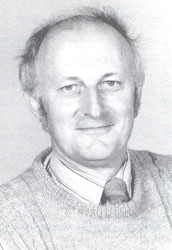J. Philip Grime facts for kids
Quick facts for kids
Philip Grime
|
|
|---|---|
 |
|
| Born |
John Philip Grime
30 April 1935 |
| Died | 19 April 2021 (aged 85) |
| Alma mater | University of Sheffield (PhD) |
| Known for | Universal adaptive strategy theory Intermediate disturbance hypothesis |
| Awards | Alexander von Humboldt Medal (2011) |
| Scientific career | |
| Fields | Ecology |
| Institutions | University of Sheffield Connecticut Agricultural Experiment Station |
| Thesis | A study of the ecology of a group of Derbyshire plants with particular reference to their nutrient requirements (1960) |
| Influenced | Sandra Díaz |
John Philip Grime (born April 30, 1935, died April 19, 2021) was a famous ecologist and professor at the University of Sheffield in England. He is most famous for his ideas about how plants adapt to their environment. This is called the universal adaptive strategy theory (UAST). He also developed the intermediate disturbance hypothesis. This idea explains how different levels of disturbance can affect how many types of plants live in an area.
Grime wrote a very important book in 1979 called Plant Strategies and Vegetation Processes. This book has been used as a reference by other scientists over 1,200 times. His many scientific papers also made him a highly cited scientist. He once said that "Ecology lacks a Periodic Table," meaning that ecology needs a clear system like the one used in chemistry.
Contents
Becoming an Ecologist
Philip Grime studied at the University of Sheffield. He earned his PhD degree there in 1960. His studies focused on how plants in Derbyshire, England, used nutrients from the soil.
Career and Plant Research
Grime started working at the botany department at the University of Sheffield in 1961. He also spent some time working in the United States. From 1963 to 1964, he was at the Connecticut Agricultural Experiment Station.
After that, he returned to the University of Sheffield. He joined the unit of comparative plant ecology. This group was started in 1961 by Professor Ian H. Rorison. Grime was the deputy director of this unit from 1964 to 1989. He then became the director in 1989.
Plant Strategies: CSR Theory
Philip Grime's main work and theories are about how plants develop strategies over time. His famous CSR theory says that every plant species uses a mix of three main strategies:
- C for Competitive: These plants are good at competing for resources like light and nutrients.
- S for Stress Tolerant: These plants can survive in tough conditions, like very dry or cold places.
- R for Ruderal: These plants grow quickly and produce many seeds. They do well in disturbed areas, like places where the soil has been turned over.
Grime also created a way to classify different types of plant life. He did this by looking at how important these three strategies were in the plants found in an area.
Awards and Recognition
Philip Grime received many awards and honors for his important work.
- In 1991, he became a foreign member of the Royal Netherlands Academy of Arts and Sciences.
- In 1997, he won the Marsh Ecology Award from the British Ecological Society. He also became an honorary member of the Ecological Society of America.
- In the same year, he was a special visiting ecologist at Pennsylvania State University.
- In 1998, he was chosen as a Fellow of the Royal Society (FRS). This is a very high honor for scientists in the UK. He also received an honorary doctor degree from the University of Nijmegen.
- Since 1999, he has been an honorary member of the British Ecological Society.
- In 2011, he was the very first person to receive the Alexander von Humboldt Medal. This award recognized his amazing contributions to understanding plant communities.
In 2013, the Journal of Ecology published a special collection of Grime's most important papers. He even wrote a blog post and recorded an interview to go along with it.
 | May Edward Chinn |
 | Rebecca Cole |
 | Alexa Canady |
 | Dorothy Lavinia Brown |

